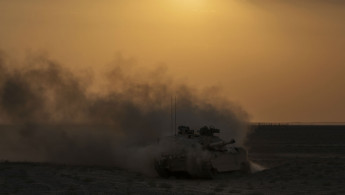East of Suez: Britain's new Gulf military build-up
"We will create a permanent presence in the region... with more British warships, aircraft and personnel deployed on operations in the Gulf than in any other part of the world," Prime Minister Theresa May declared back in 2016.
May identified Oman and Bahrain as the most important states for Britain's new presence.
In April, the UK opened its first permanent base in the region since the 1971 withdrawal. The HMS Juffair naval facility in Bahrain's Mina Salman Port can host 500 Royal Navy personnel.
Britain also seeks to develop a significant military and commercial presence in Oman's major Duqm port. Beginning in early October, 5,500 British soldiers participated in a major joint exercise with 70,000 of their Omani counterparts, the largest such exercise in Oman's history.
Twitter Post
|
"This is the largest military exercise that is going on in the world at present," announced British Defence Secretary Gavin Williamson on a recent visit to British troops in the Sultanate. "Britain isn't retreating from the world. We are stepping out."
Hundreds of British troops will also be deployed to a new military base in Oman beginning next March. Williamson announced this during his visit, in which he rode on a British-made Challenger 2 main battle tank flying the Union flag.
Incidentally, Oman is the only country Britain has ever sold its formidable Challenger 2 tanks to.
Britain and Oman have had very good relations over the years. London helped Muscat defeat the Dhofar rebellion, which lasted from the early 1960s until the mid-1970s. Queen Elizabeth II has even visited Oman twice, once in 1979 and more recently in 2010.
After its withdrawal in 1971, Britain's only major permanent base near the Middle East were its sovereign bases in Cyprus. While British troops have been deployed to the region, most significantly during the 1991 Gulf War and the 2003 Iraq War, those deployments were temporary.
The 1971 withdrawal was the result of Britain's growing inability to continually fund major military bases and troop deployments around the world. Its present redeployment to the region is part of the May administration efforts to cultivate more relationships around the world post-Brexit, efforts that have included some morally questionable deal making.
A formidable British presence in the region will likely help London secure further lucrative arms sales with the Arab Gulf states, which make British arms firms billions of pounds and also help safeguard jobs in Britain itself.
Following Saudi Crown Prince Mohammed bin Salman's visit to the UK last March, Downing Street announced it had reached an agreement for an enormous £65 billion (about $83 billion)-worth of investment and trade. A memorandum of intent was also signed for Saudi Arabia to purchase an additional 48 Eurofighter Typhoon jet fighters built in part by Britain's BAE Systems aerospace company.
Any British military presence in the Gulf is always staunchly opposed by Iran, which has always viewed the Gulf as its own backyard. This latest build-up is no exception.
Twitter Post
|
Before Britain's withdrawal from the Gulf in 1971, London expressed clear opposition to Iran, then ruled by the Shah, becoming the sole military power there.
Despite this, the Shah's Iran became the predominant power in the region shortly thereafter thanks to the billions in oil sales it got as a result of the 1973 Arab oil embargo on the West. Britain, along with the United States, sold the Shah an enormous amount of advanced weapons systems. Britain built and sold Iran frigates, which enabled Tehran to become the largest and most powerful naval force in the Gulf in the 1970s. It also sold Iran a massive fleet of Chieftain tanks, its most advanced and modern tank at the time.
Since then the tables have turned. In more recent decades Saudi Arabia's exorbitant spending on hi-tech American and British weapon systems has far exceeded those of the Shah's. Britain's sale of 72 Eurofighters to the Saudis back in 2007 was valued at £20 billion ($41 billion) - at that time, a truly enormous weapons contract. Shortly thereafter, in 2010, the United States also secured a record arms deal with the Saudis worth approximately $60 billion.
It's against the backdrop of these titanic arms deals to Iran's Gulf rivals and the ongoing Iran-Saudi cold war, along with its accompanying proxy wars across the region, that Britain is re-establishing a military presence in the Gulf which it openly says it plans to make permanent. Consequently, if any major conflict is to erupt in that volatile region, British forces will likely be caught up in the middle of it.
Paul Iddon is a freelance journalist based in Erbil, Iraqi Kurdistan, who writes about Middle East affairs.
Follow him on Twitter: @pauliddon



